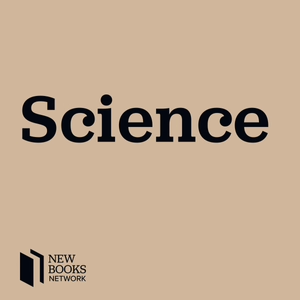
The Future of Innovation: A Discussion with Min W. Jung
11/26/23 • 35 min
1 Listener
Humans have been so dominant on Earth in large part because of their capacity to innovate – but how does that work exactly? Why can they innovate so much? That issue has been studied by Professor Min W. Jung from the Center for Synaptic Brain Dysfunctions at the Institute for Basic Science in South Korea. He is the author of A Brain for Innovation: The Neuroscience of Imagination and Abstract Thinking (Columbia UP, 2023). Listen to him in conversation with Owen Bennett Jones.
Owen Bennett-Jones is a freelance journalist and writer. A former BBC correspondent and presenter he has been a resident foreign correspondent in Bucharest, Geneva, Islamabad, Hanoi and Beirut. He is recently wrote a history of the Bhutto dynasty which was published by Yale University Press.
Learn more about your ad choices. Visit megaphone.fm/adchoices
Support our show by becoming a premium member! https://newbooksnetwork.supportingcast.fm/science
Humans have been so dominant on Earth in large part because of their capacity to innovate – but how does that work exactly? Why can they innovate so much? That issue has been studied by Professor Min W. Jung from the Center for Synaptic Brain Dysfunctions at the Institute for Basic Science in South Korea. He is the author of A Brain for Innovation: The Neuroscience of Imagination and Abstract Thinking (Columbia UP, 2023). Listen to him in conversation with Owen Bennett Jones.
Owen Bennett-Jones is a freelance journalist and writer. A former BBC correspondent and presenter he has been a resident foreign correspondent in Bucharest, Geneva, Islamabad, Hanoi and Beirut. He is recently wrote a history of the Bhutto dynasty which was published by Yale University Press.
Learn more about your ad choices. Visit megaphone.fm/adchoices
Support our show by becoming a premium member! https://newbooksnetwork.supportingcast.fm/science
Previous Episode

Darwinian Accident or Divine Architect? (with Jay Richards)
Jay Richards PhD, OP discusses the new book to which he contributed a chapter, God’s Grandeur: The Catholic Case for Intelligent Design (Sophia Institute Press, 2023), edited by Ann Gauger. We take on the insufficient explanations of Darwinian orthodoxy which insists that our world—from the vast cosmos to the also vast (in its complexity) genetic code in our cells.
At the end of this episode (at 55 minutes), we hear an update from Father Piotr Żelazko in Israel as we enter the second month of the Gaza War.
- Here’s the book, God’s Grandeur: The Catholic Case for Intelligent Design, edited by Ann Gauger (Sophia Institute Press, 2023)
- Here’s Jay Richard’s webpage at the Heritage Foundation.
- Here’s the debate between Jay Richards and Christopher Hitchens from 2008 at Stanford.
- Father Piotr Żelazko on Almost Good Catholics, episode 71: Live from Israel: Catholics in the Holy Land Today.
Krzysztof Odyniec is a historian of Medieval and Early Modern Europe; he is also the host of the 'Almost Good Catholics' podcast.
Learn more about your ad choices. Visit megaphone.fm/adchoices
Support our show by becoming a premium member! https://newbooksnetwork.supportingcast.fm/science
Next Episode

Coleen T. Murphy, "How We Age: The Science of Longevity" (Princeton UP, 2023)
All of us would like to live longer, or to slow the debilitating effects of age. In How We Age: The Science of Longevity (Princeton UP, 2023), Coleen Murphy shows how recent research on longevity and aging may be bringing us closer to this goal. Murphy, a leading scholar of aging, explains that the study of model systems, particularly simple invertebrate animals, combined with breakthroughs in genomic methods, have allowed scientists to probe the molecular mechanisms of longevity and aging. Understanding the fundamental biological rules that govern aging in model systems provides clues about how we might slow human aging, which could lead in turn to new therapeutics and treatments for age-related disease.
Among other vivid examples, Murphy describes research that shows how changing a single gene in the nematode worm C. elegans doubles its lifespan, extending not only the end of life but also the youthful, healthy part of life. Drawing on work in her own lab as well as other recent research, Murphy chronicles the history and current state of the field, explaining longevity's links to reproduction and mating, sensory and cognitive function, inheritances from our ancestors, and the gut microbiome. Written with clarity and wit, How We Age provides a guide to the science: what we know about aging, how we know what we know, and what we can do with this new knowledge.
Learn more about your ad choices. Visit megaphone.fm/adchoices
Support our show by becoming a premium member! https://newbooksnetwork.supportingcast.fm/science
If you like this episode you’ll love
Episode Comments
Generate a badge
Get a badge for your website that links back to this episode
<a href="https://goodpods.com/podcasts/new-books-in-science-11213/the-future-of-innovation-a-discussion-with-min-w-jung-37762948"> <img src="https://storage.googleapis.com/goodpods-images-bucket/badges/generic-badge-1.svg" alt="listen to the future of innovation: a discussion with min w. jung on goodpods" style="width: 225px" /> </a>
Copy



